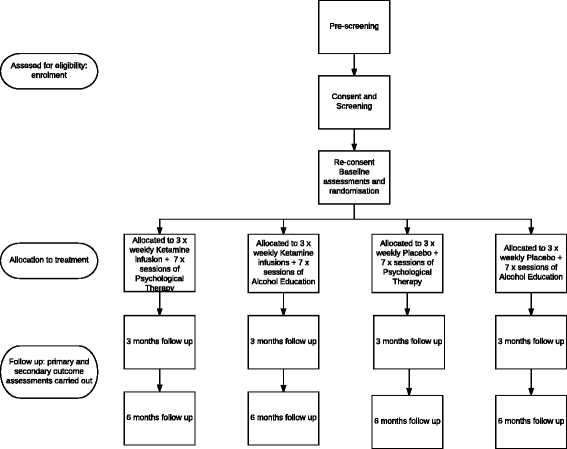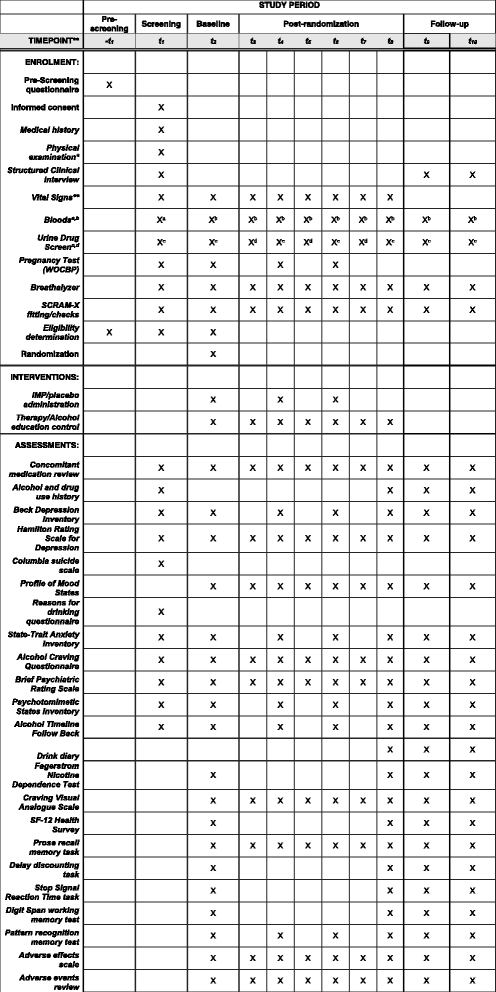A proof-of-concept investigation into ketamine as a pharmacological treatment for alcohol dependence: study protocol for a randomised controlled trial
- PMID: 28372596
- PMCID: PMC5379743
- DOI: 10.1186/s13063-017-1895-6
A proof-of-concept investigation into ketamine as a pharmacological treatment for alcohol dependence: study protocol for a randomised controlled trial
Abstract
Background: Worldwide, alcohol abuse is a burgeoning problem. Abstinence is key to allow recovery of physical and mental health as well as quality of life, but treatment for alcohol dependence is associated with high relapse rates. Preliminary data have suggested that a combined repeated ketamine and psychological therapy programme may be effective in reducing relapse in severe alcohol use disorder. This non-commercial proof-of-concept trial is aimed at making a preliminary assessment of the effectiveness of this combined treatment in this patient group.
Methods/design: This is a phase II, randomised, double-blind, placebo-controlled, parallel-group clinical trial taking place in two sites in the UK: the South West of England and London. Ninety-six recently detoxified alcoholics, with comorbid depressive symptoms, will be randomised to one of four treatment arms. Patients will receive either three sessions of ketamine (0.8 mg/kg administered intravenously (IV) over 40 minutes) or placebo (50 ml saline 0.9% IV over 40 minutes) plus either seven sessions of manualised psychological therapy or an alcohol education control. Patients will be assessed at 3 and 6 months on a range of psychological and biological variables. The primary endpoints are (1) relapse rates at 6 months and (2) percentage days abstinent at 6 months. Secondary endpoints include 3 and 6 month percentage days abstinence, tolerability (indicated by dropout), adverse events, depressive symptoms, craving and quality of life.
Discussion: This study will provide important information on a new combined psychological and pharmacological intervention aimed at reducing relapse rates in alcoholics. The findings would have broad application given the worldwide prevalence of alcoholism and its associated medical, psychological and social problems.
Trial registration: ClinicalTrials.gov, NCT02649231 . Registered on 5 January 2016.
Keywords: Alcoholism; Depression; Ketamine; Relapse.
Figures


References
-
- World Health Organisation. Global status report on alcohol and health. 2011. http://www.who.int/substance_abuse/publications/global_alcohol_report/ms....
-
- Health and Social Care Information Centre Statistics on Alcohol: England 2011; 2012. 2012. http://content.digital.nhs.uk/pubs/alcohol11.
-
- Kolp E, Krupitsky E, Young MS, Jansen K, Friedman H, O’Connor LA. Ketamine-enhanced psychotherapy: preliminary clinical observations on its effects in treating death anxiety. Int J Transpersonal Stud. 2007;26:1–17.
Publication types
MeSH terms
Substances
Associated data
Grants and funding
LinkOut - more resources
Full Text Sources
Other Literature Sources
Medical

